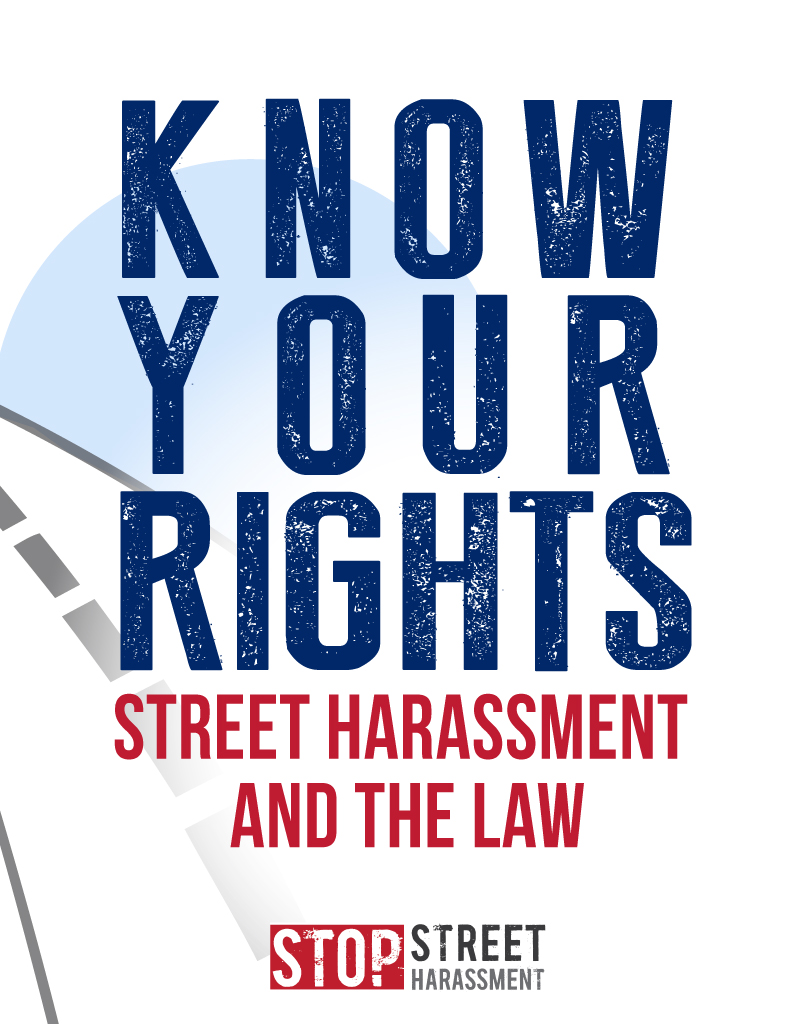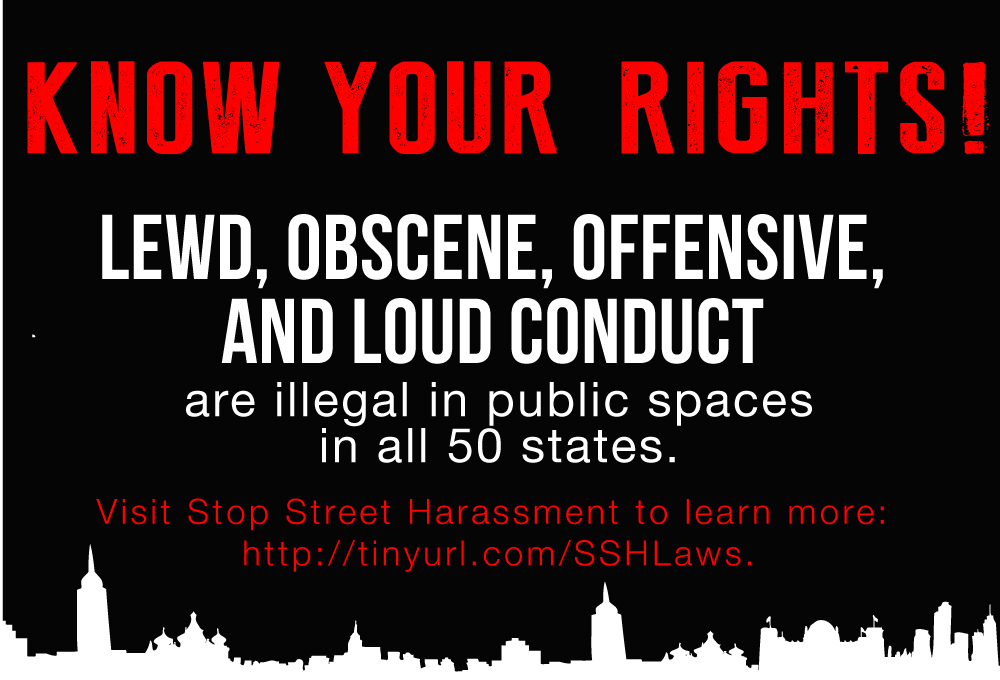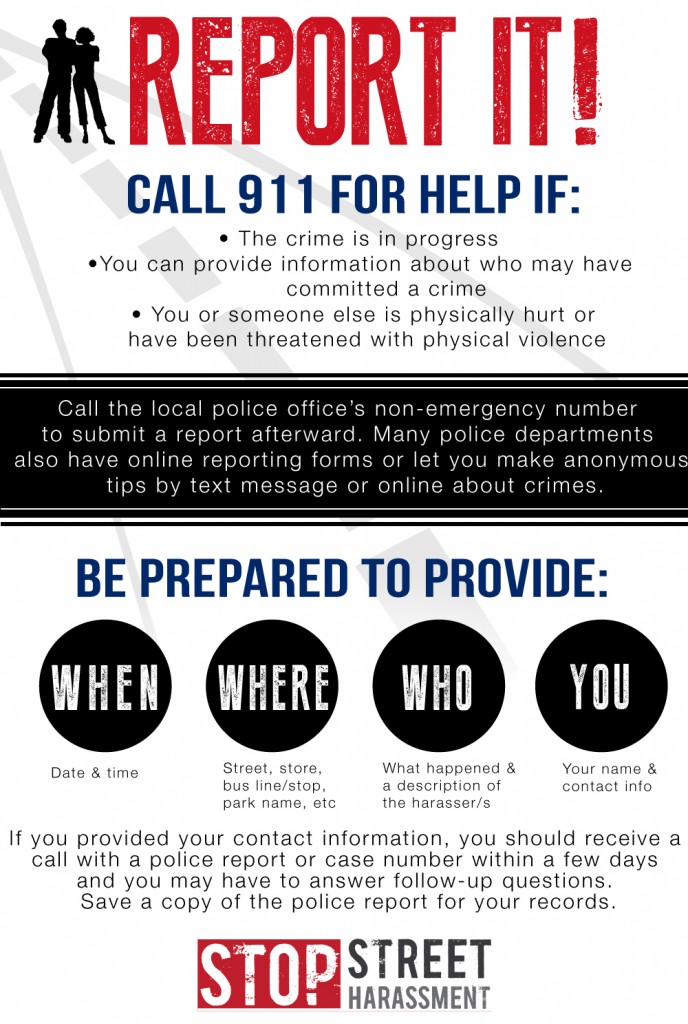 Stop Street Harassment is pleased to announce the release of our newest publication and online resource Know Your Rights: Street Harassment and the Law.
Stop Street Harassment is pleased to announce the release of our newest publication and online resource Know Your Rights: Street Harassment and the Law.
We’ve spent the summer and fall surveying the laws in all 50 U.S. states and D.C. and we have good news: many common street harassment behaviors (such as groping, indecent exposure, and up-skirt photos) are illegal across the U.S. That means you can report street harassment to the police and hold a street harasser legally accountable for his or her actions (when you feel that’s appropriate).
Street harassment is not specifically criminalized the way sexual harassment in the workplace and schools is. However, state laws like Disorderly Conduct, Invasion of Privacy, and Sexual Misconduct prohibit many common street harassment behaviors. Each state has their own set of rules about public behavior and sexual harassment, so we’ve laid out what the relevant crimes are called in each state’s code and let you know exactly what’s legal and what isn’t.
As of today – Human Rights Day – you can find all of this information online or you can download a PDF of the complete toolkit.
 We think the Know Your Rights toolkit is a ground-breaking project in the fight against street harassment because, for the first time, all of the state-level criminal law that could be used to stop street harassment has been compiled, analyzed, and made accessible to anyone who needs them. In a society that says street harassment is a compliment, we want you to be able to say, “No, it’s disorderly conduct.”
We think the Know Your Rights toolkit is a ground-breaking project in the fight against street harassment because, for the first time, all of the state-level criminal law that could be used to stop street harassment has been compiled, analyzed, and made accessible to anyone who needs them. In a society that says street harassment is a compliment, we want you to be able to say, “No, it’s disorderly conduct.”
We hope you will use this information to exercise your right to protection from the police when you experience illegal street harassment and to encourage your local lawmakers to further protect women, people of color, and members of the LGBTQ community in public spaces.
Of course, we know that reporting harassment to the police or criminalizing harassment are not the only ways to end street harassment. In some cases, these may not even be the best ways. Criminalizing behavior can be problematic when laws are disproportionately applied to low-income communities and communities of color. With that in mind, Stop Street Harassment encourages you to engage with your local law enforcement to ensure the law is always applied fairly and that your community handles street harassment in the most constructive way possible. We endeavor to provide you with information so that you can advocate for your rights to safe public spaces and to the other freedoms you are entitled to under the law, such as due process.
 As we’ve said before, there is no best way to deal with street harassment – every person and situation differs. Ending street harassment for good will require a multi-pronged approach, including education, awareness campaigns, and engaging the legal system. If a street harasser does commit a crime against you, we want to equip you to make an informed decision. Armed with that knowledge, you can then decide whether or not to report harassers to law enforcement, especially for crimes like up-skirt photos, public masturbation, stalking, and groping.
As we’ve said before, there is no best way to deal with street harassment – every person and situation differs. Ending street harassment for good will require a multi-pronged approach, including education, awareness campaigns, and engaging the legal system. If a street harasser does commit a crime against you, we want to equip you to make an informed decision. Armed with that knowledge, you can then decide whether or not to report harassers to law enforcement, especially for crimes like up-skirt photos, public masturbation, stalking, and groping.
Take a look at your state’s section of the toolkit to get an idea of the kinds of street harassment that are illegal – or to report a crime that has already happened. You’ll also find useful information in the Introduction, including what to expect when you report street harassment and how to deal with harassment from police officers themselves.
Finally, we’d like to add one important takeaway from our work on the project: in speaking with several police officers around the country, we learned that you can engage a police officer or call 911 any time you feel threatened, even before a crime has been committed. This seems obvious in retrospect, but 75% of women report they have been followed and yet few report it to the police. If you think someone is following you, or you feel otherwise scared, intimidated, or threatened, you have the right to help from the police.
They say knowledge is power, friends, so here’s a nation’s worth.
Have you reported street harassment to the police? What happened? What did you learn about your local laws from our toolkit? How do you plan to use this knowledge? Share your story in the comments
Talia Hagerty has been an intern with Stop Street Harassment since June 2013. She is also a peace economics consultant working on a variety of projects that ensure the equitable economic participation of all. She holds a B.A. in Economics from Eckerd College and an M.S. in Global Affairs with a concentration in Peacebuilding from New York University. Talia blogs about peacebuilding, human rights, economic development, and witty responses to street harassment. Follow her on Twitter: @taliahagerty.
